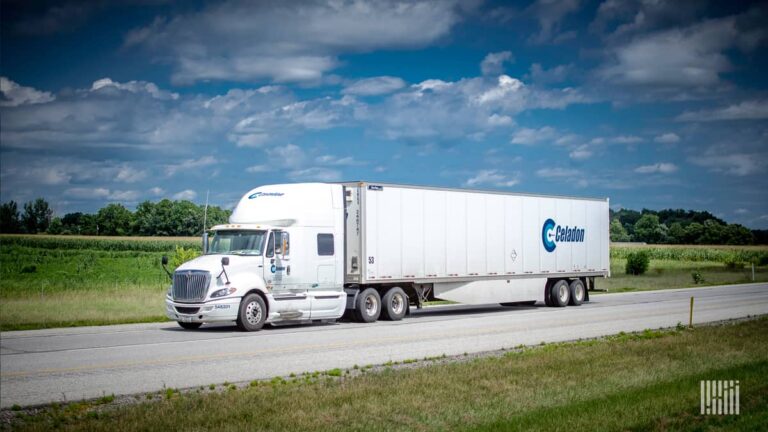Updated Dec. 9, 2019; 12:15 pm CT
INDIANAPOLIS – Celadon Group, Inc., among the nation’s top carriers and based in Indianapolis, declared bankruptcy December 9, leaving thousands without jobs and stranded across the U.S. as fuel cards were apparently cut off without notice. The shutdown ended a tumultuous week for the carrier that saw two previous executives charged with federal fraud, leading to over $60 million in losses to company shareholders. The bankruptcy filing is expected to be the largest in the trucking industry’s history.
Announcement came without warning; trucking industry responds
The announcement of the immediate closure of Celadon was largely unexpected by the company’s employees, many of whom found themselves stranded over the weekend as drivers reported fuel cards being cut off, repossession of equipment at the Celadon Indianapolis terminal, and mobile fleet maintenance contractors refusing to respond to requests for assistance from Celadon drivers. Drivers also reported phone calls to the corporate office going unanswered.
The shock of the immediate shutdown wasn’t only a surprise to Celadon employees but to the entire trucking industry. As an industry made up of like-minded professionals, the trucking industry “family” responded in kind. Various drivers, industry advocates, and carriers posted messages on social media sites offering help to stranded drivers. As news of the inevitable spread over the weekend, drivers and carriers shifted focus to helping fellow industry employees.
Many drivers offered rides to Celadon drivers in order to get them closer to home, and others offered meals, showers, and overnight lodging at no cost. Even competing carriers and logistics companies stepped up in support of the drivers.
MVG Logistics posted, “Celadon has shut down and filed bankruptcy, leaving some of its drivers stranded after shutting down fuel cards with no warning …. We just fueled up two Celadon drivers so they can make it home. No, they [Celadon] don’t dispatch or use mvglogistics.com services but we believe in no driver left behind …. A driver is a driver; we don’t care whose team they’re on!”
Several carriers responded to the shutdown with offers of jobs beginning immediately. Hirschbach posted, “If you are a driver looking for a new company to call home, we have recruiters working this weekend to answer questions. If you are not interested in a job with Hirschbach but are in need of a way home, we are offering free bus tickets to Celadon drivers who are stranded.”
Other carriers including Southland Transportation Company, ShipEX, and CRST Expedited offered similar assistance. One Celadon driver stated that recruiters from other carriers were at the company’s Indianapolis terminal making job offers despite the chaos surrounding them.
The company
Celadon Group, Inc., formed in 1985, had grown into one of the largest carriers in the United States, its central location of Indianapolis providing a hub for north- and south-bound routes to and from Mexico and Canada. Based on 2017 data, Celadon operated 3,200 company-owned trucks, along with 400 lease-to-own rigs and 250 owner-operators. The company owned 10,000 trailers.
In 2015, the Journal of Commerce ranked Celadon as the second fastest-growing carrier in the U.S. Three years later, Logistics Management ranked the carrier as the 16th largest in terms of revenue, but the data did show cracks forming. Among the top 25 revenue-generating carriers, Celadon was one of two that saw revenues decrease (-11%) from 2017. In 2019, Transport Topics listed Celadon as No. 38 in its top 100 for-hire carriers.
Timeline of events
The announcement of the Celadon Chapter 11 bankruptcy filing and cease of operations came just days after two former executives were charged with defrauding stockholders by providing intentionally misleading information related to the financial status of the company.
Josh Minkler, U.S. Attorney for the Southern District of Indiana announced on December 5 that William Eric Meek, former chief operating officer of Celadon, and Bobby Lee Peaver, former chief financial officer, conspired to make Celadon more attractive to investors by providing false statements to company accountants and falsifying records. The charges also include conspiracy to commit wire and securities fraud. Minkler stated that both individuals will face “decades” in prison following an investigation by the FBI, U.S. Department of Justice, Postal Inspection Service, and the Securities and Exchange Commission.
The following is a timeline of events as known this morning:
2016: Meek, Peavler, and other Celadon executives knew a substantial portion of its fleet had declined in value due to an industry slowdown, increased maintenance costs, and age. Meek and Peavler devised a scheme to conceal the millions of dollars in losses from shareholders and banks.
May 2017: Celadon announced financial statements for fiscal year 2016 and the first two quarters of 2017 were unreliable, as were independent auditor reports. The announcement sent Celadon stock value into a tailspin, creating a one-day loss to investors of $62.3 million. Celadon was delisted by the New York Stock Exchange. Meek and Peavler immediately left the company.
Early 2019: Celadon agreed to pay $42.2 million in restitution to settle securities fraud charges.
December 5, 2019: Meek and Peavler were arrested on federal fraud charges based on their effort to defraud Celadon stockholders. Prosecutors said their scheme involved the following:
- Inflating invoices old older used trucks that they traded for new trucks;
- Selling trucks to a dealer near the end of a fiscal quarter without disclosing that a company division, Quality Companies, agreed to pay the dealer back after the quarter ended;
- Making false and misleading statements to auditors about the transactions;
- Peavler directing a senior executive to delete certain emails after auditors requested relevant documents.
Following the announcement of charges, lenders began repossessing Celadon equipment.
December 6, 2019: Internal Celadon sources began leaking information on the intent to file for bankruptcy as well as notifying its largest customers to find other carriers. It provided no such information to employees, many learning from customers and drivers who had been in contact with customers late in the evening. Shippers began cancelling loads late that evening as well.
December 7, 2019: Comdata, provider of fuel cards for Celadon, shut off cards as drivers reported trucks being repossessed and towed from truck stops.
December 8, 2019: Drivers were provided conflicting data from the carrier’s headquarters, some being told to complete their deliveries and others told to stop and leave their trucks. Reports indicate that employees were instructed to meet at the company’s Indianapolis headquarters this morning
December 9, 2019: Apparently just after midnight, Celadon sent the following message to employees over its electronic messaging system:
**FLEETWIDE MESSAGE: WE REGRET TO INFORM EVERYONE THAT CELADON GROUPT, INC. HAS FILED FOR CHAPTER 11 BANKRUPTCY. WE WILL CONTINUE TO HAUL AND DELIVER ALL LOADS THAT WE NOW HAVE IN TRANSIT. WE WILL HAVE MORE INFORMATION IN THE MORNING AS TO WHERE EQUIPMENT NEEDS TO BE DELIVERED TO. WE HAVE BEEN ASSURED THAT EVERYONE WHO FOLLOWS INSTRUCTIONS WILL BE PAID FOR THE WORK AND THE MILES ASSIGNED AND COMPLETED, AND CELADON WILL NOT LEAVE ANYONE STRANDED AWAY FROM HOME. FINALLY, WE TRULY APPRECIATE YOUR COMMITMENT AND DEDICATION TO THIS COMPANY, AND WISH YOU ALL LUCK MOVING FORWARD.
CELADON MANAGEMENT
In his Monday morning announcement of the Chapter 11 filing, Paul Svindland, Celadon’s CEO, stated, “We have diligently explored all possible options to restructure Celadon and keep business operations ongoing; however, a number of legacy and market headwinds made this impossible to achieve.”
Reports late this morning indicated Celadon will pay $5.44 million in unpaid wages and termination bonuses. The bonuses amount to approximately $267 per employee. The company’s stock, which sold for over $20 in 2015, was being sold for $.041 per share on Friday, December 6. This morning, December 9, a share could be purchased for $0.03.
The timing of the announcement could not have been worse for most Celadon employees. If there is a silver lining around this cloud, it’s the reinforcement of the fact that the trucking industry, despite competition, comes together as a family and helps its own when turmoil strikes.
EARLIER STORY
INDIANAPOLIS – Celadon Group, Inc. today announced that it, along with its 25 affiliate entities, have filed voluntary petitions for relief under Chapter 11 of the Bankruptcy Code in the U.S. Bankruptcy Court for the District of Delaware. Celadon also announced that it will shut down all of its business operations effective as of today, Monday, December 9, 2019. This shut down does not include the Taylor Express business headquartered in Hope Mills, North Carolina, which will continue to operate in the ordinary course while the Company’s explores a going concern sale of its operations.
Celadon intends to use its Chapter 11 proceedings to wind down its global operations.
Paul Svindland, Chief Executive Officer of Celadon, said, “We have diligently explored all possible options to restructure Celadon and keep business operations ongoing, however, a number of legacy and market headwinds made this impossible to achieve.” Svindland noted that, “Celadon has faced significant costs associated with a multi-year investigation into the actions of former management, including the restatement of financial statements. When combined with the enormous challenges in the industry, and our significant debt obligations, Celadon was unable to address our significant liquidity constraints through asset sales or other restructuring strategies. Therefore, in conjunction with our lenders, we concluded that Celadon had no choice but to cease all operations and proceed with the orderly and safe wind down of our operations through the Chapter 11 process.” To support the wind down of operations, Celadon’s lenders have agreed to provide incremental debtor-in-possession financing.
Svindland further stated, “I would like to thank our vendors, customers, and lenders, and most importantly, I would like to thank our dedicated administrative employees and drivers whose efforts should not be seen as a reflection of this Chapter 11 filing. They have sacrificed so much of their time and effort for Celadon, and for that, the Company is eternally grateful.”
Since retiring from a career as an outdoor recreation professional from the State of Arkansas, Kris Rutherford has worked as a freelance writer and, with his wife, owns and publishes a small Northeast Texas newspaper, The Roxton Progress. Kris has worked as a ghostwriter and editor and has authored seven books of his own. He became interested in the trucking industry as a child in the 1970s when his family traveled the interstates twice a year between their home in Maine and their native Texas. He has been a classic country music enthusiast since the age of nine when he developed a special interest in trucking songs.









I don t work for Celadon,but I knew this day was coming,I guess the only ones who didn t know were the employees.
There is no more blind than the one who refuses to see.
The old man left the company in a bad shape,it just went down from there,poorly managed,wasted money,unethical management.
It truly is a study case of what not to do when you are on top.
How the mighty has fallen.
Werner Enterprises is next.
theirs going be alot more company going down and out after xmas because of higher fuel and drivers shortage
Trucking went downhill long time ago, and has only gotten worse with increased emissions on trucks, too much competition driving rates down and fuel costs staying high as well as trying to keep drivers with wage increases. Let’s also not forget the cost of operations, equipment purchases and things like weather and other factors. I got out of trucking couple years ago mainly for health reasons, but also because I saw the struggles as a owner operator and as a company driver. The implementation of electronic logging hasn’t helped either in terms of drivers being productive and companies getting freight moved. Its a variable industry trying to be forced into a micro managed time constraint. Its actually incredible that any company can survive with so many negatives affecting it. We shouldn’t wonder why fraud was involved with Celedon because its become a way of staying alive in a tough industry of storms.